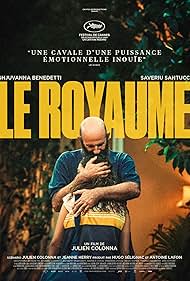Noticias
Categoría: TORRENT
TORRENT
Kelly Macdonald and Damian Lewis star in a darkly comedic thriller about a seemingly ordinary suburban family with a juicy secret: they’re vampires. In the light of day, the Radleys may seem normal, but they can only refrain from their natural desires for so long before the bloody truth bubbles to the surface and turns their quiet country life upside down.
Scenario
Japanese Metal Band BABYMETAL's Concert film which took place in Okinawa,as the finale of their BABYMETAL WORLD TOUR 2023-2024 on March 24, Japanese), divine creature in myth of Okinawa where concert took place. Shisa, also known as shi shi dog, looks like a mix of a dog and lion. Shisa statue usually sits in front of building, guarding the place from disaster, villanious soul and so on. There is a huge Shisa head in the back of the stage at the end of the runway.
He is charming
Scenario
He is smart. He is Dexter Morgan, America’s favorite serial killer who solves crimes by day and by night. In Season 8, Angel Batista wasn’t always played by David Zayas.
His son David Zayas Jr
plays the father in some shots, as the two look remarkably alike. Throughout the first season, Dexter is seen with a large scar on his left side. Later, during the second season, the scar moved to the right side, while the left side remained intact.
Presented at the 64th Golden Globe Awards (2007)
Dexter Morgan: I lived in the dark for a long time. Over the years my eyes adjusted until darkness became my world and I could see. Main ThemeWritten by Rolfe KentPerformed by Rolfe Kent.
all the time
Thanks to quarantine I’ve seen shows I never thought I’d ever see, one of those shows was Dexter which I heard had a bad ending so I decided not to watch it, what a bummer, I missed watching one of the best shows ever. Dexter has eight seasons and a renewed new season to fix the bad ending, and everyone loves it. All seasons are great, from the first to the seventh, except for the last one.
They rate every season like this
First 9.7 Second 9.6 Third 8.7 Fourth 9.9 Fifth 9.0 Sixth 8.9 Seventh 9.0 Last Season 7.0 Waiting for the new season
The Bette Davis quote shown at the beginning of the film is misquoted
Scenario
In 1980s Hollywood, adult film star and aspiring actress Maxine Minx finally gets her big break. But as a mysterious killer stalks the starlets of Hollywood, a trail of blood threatens to reveal her sinister past.. The Hollywood star Maxine puts her cigarette out on is Theda Bara's, the actress Pearl took inspiration from to name her alligator in Pearl (2022)..
I crushed her fucking head
It is actually "Until you're known in my profession as a monster, you're not a star.". Maxine Minx: Do you know what happened to the last person who tried to kill me? Fitting with the film's 80s aesthetic, after the credits, a "Be kind rewind" sticker is shown, like on many video store rentals..
Edited from X (2022)
Gimme All Your LovinWritten by Frank Beard (as Frank Lee Beard), Billy Gibbons & Dusty Hill (as Joe Michael Hill)Performed by ZZ TopCourtesy of Warner RecordsBy arrangement with Warner Music Group Film & TV Licensing. Shoutout to the filmmakers for a great trailer because that's about where the greatness ends.This film has a pretty solid start for the first 15-20 minutes that seems to set the tone, but it abandons that tone along the way pretty fast. The plot is lackluster and does nothing at all to make you care about any of the characters other than Maxine.
Although, sometimes, Maxine is insufferable
Several of the decisions she makes in the movie do not make sense and are incredibly inconsistent with the character.EVERY "twist" in the movie's plot is predictable if you've watched more than 10 movies in your lifetime.Kevin Bacon was awesome as usual. That's the only reason I gave this a 3.. A24 has produced some of the most memorable horror films of the 21st century.
See which films ranked highest on IMDb
The adventure takes a turn when the odd couple’s tensions resurface against the backdrop of their family history
Scenario
Mismatched cousins David and Benji reunite for a trip to Poland to honor their beloved grandmother. When Benji and David visit their grandmother’s home in Poland, the setting is Jesse Eisenberg; The real-life ancestors settled in the diaspora.
I watched this in 2024
Benji Kaplan: This, folks, is shitty moviemaking. Posted in Amanda the Jedi Show: The BEST and Weirdest Movies You (Mostly) Haven’t Seen Yet | Love Bleeds Mind (2024).
at the Sundance Film Festival
Jesse Eisenberg previously made When You Done Saving the World; it was interesting, but unfortunately a bit boring. Eisenberg’s direction and writing of this film shows much improvement, with many interesting and engaging characters, good dialogue, and great performances, especially from Kieran Culkin who steals the show throughout the film.
It included beautiful camerawork, a good soundtrack, and conversations that felt real, genuine, and engaging to watch
The story explores family history and complex relationships, as each theme and exploration was well explored and was fun, emotional, and compelling to watch. Eisenberg’s approach to chemistry, structure, and pacing was good, as he created a personal and compelling story about family history and the true meanings of bonds and relationships.
There were a few soundtrack choices that felt a little out of place
But overall, Eisenberg has improved, and I look forward to seeing what else he has to offer today. Check out the full lineup for the 62nd New York Film Festival this fall.
Revo Uninstaller gives you the convenience of optimizing your device as well as getting rid of all the program files you don’t need and slowing down your computer’s processes
Revo Uninstaller Pro 5.1 FULL Revo Uninstaller Pro is an innovative installation program that helps you uninstall unnecessary software and remove unwanted programs that are easily installed on your personal computer.
There may still be traces left behind, such as registry items or program files and folders
You might be surprised to know that the “Add/Remove Programs” option in the Windows Control Panel doesn’t always completely remove all software data from your system.
Why use Revo Uninstaller Pro?
Now with Revo Uninstaller you can be sure that you will be able to clean your system from all these remnants and bring more convenience and optimization to your device.




 19/38
19/38


 16/36
16/36







